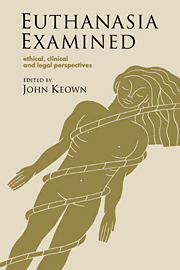Book contents
- Frontmatter
- Contents
- List of contributors
- Acknowledgements
- Foreword by Daniel Callahan
- Introduction
- 1 Euthanasia and the value of life
- 2 A philosophical case against euthanasia
- 3 The philosophical case against the philosophical case against euthanasia
- 4 The fragile case for euthanasia: a reply to John Harris
- 5 Final thoughts on final acts
- 6 Misunderstanding the case against euthanasia: response to Harris's first reply
- 7 Euthanasia: back to the future
- 8 The case for legalising voluntary euthanasia
- 9 Extracts from the Report of the House of Lords Select Committee on Medical Ethics
- 10 Walton, Davies, Boyd and the legalization of euthanasia
- 11 Where there is hope, there is life: a view from the hospice
- 12 Letting vegetative patients die
- 13 A case for sometimes tube-feeding patients in persistent vegetative state
- 14 Dilemmas at life's end: a comparative legal perspective
- 15 Physician-assisted suicide: the last bridge to active voluntary euthanasia
- 16 Euthanasia in the Netherlands: sliding down the slippery slope?
- 17 Advance directives: a legal and ethical analysis
- 18 Theological aspects of euthanasia
- Index
10 - Walton, Davies, Boyd and the legalization of euthanasia
Published online by Cambridge University Press: 03 May 2010
- Frontmatter
- Contents
- List of contributors
- Acknowledgements
- Foreword by Daniel Callahan
- Introduction
- 1 Euthanasia and the value of life
- 2 A philosophical case against euthanasia
- 3 The philosophical case against the philosophical case against euthanasia
- 4 The fragile case for euthanasia: a reply to John Harris
- 5 Final thoughts on final acts
- 6 Misunderstanding the case against euthanasia: response to Harris's first reply
- 7 Euthanasia: back to the future
- 8 The case for legalising voluntary euthanasia
- 9 Extracts from the Report of the House of Lords Select Committee on Medical Ethics
- 10 Walton, Davies, Boyd and the legalization of euthanasia
- 11 Where there is hope, there is life: a view from the hospice
- 12 Letting vegetative patients die
- 13 A case for sometimes tube-feeding patients in persistent vegetative state
- 14 Dilemmas at life's end: a comparative legal perspective
- 15 Physician-assisted suicide: the last bridge to active voluntary euthanasia
- 16 Euthanasia in the Netherlands: sliding down the slippery slope?
- 17 Advance directives: a legal and ethical analysis
- 18 Theological aspects of euthanasia
- Index
Summary
INTRODUCTION
This chapter essays a critique of a mixed bag of contributions to the contemporary debate about the legalization of euthanasia. ‘Walton’ in the title designates the Report of the House of Lords Select Committee on Medical Ethics, a Committee chaired by Lord Walton of Detchant; the Committee's Report was published on 17 February 1994 (for convenience I shall refer to the Committee as the Walton Committee and its report as the Walton Report). Davies and Boyd refer to the contributions to the present volume by Jean Davies and Kenneth Boyd.
The Walton Report is a very different document from the writings of Davies and Boyd which are to be considered here. It is the product of a little less than twelve months work by a distinguished Committee whose members heard, pondered and debated evidence from representatives of a fairly wide range of views. The debate within the Committee was clearly at times vigorous and sometimes evidently polarized on fundamental issues. That the Committee produced a unanimous Report is at least in part owing to two facts: the first, that certain issues were either not addressed or left unresolved; the second, that certain recommendations had a significance in the minds of some members which they lacked in the minds of others.
In assessing a report such as that of the Walton Committee, the recommendations of which relate to legislation and public policy, it is not reasonable to expect a developed argument for its recommendations.
- Type
- Chapter
- Information
- Euthanasia ExaminedEthical, Clinical and Legal Perspectives, pp. 113 - 140Publisher: Cambridge University PressPrint publication year: 1995
- 5
- Cited by



